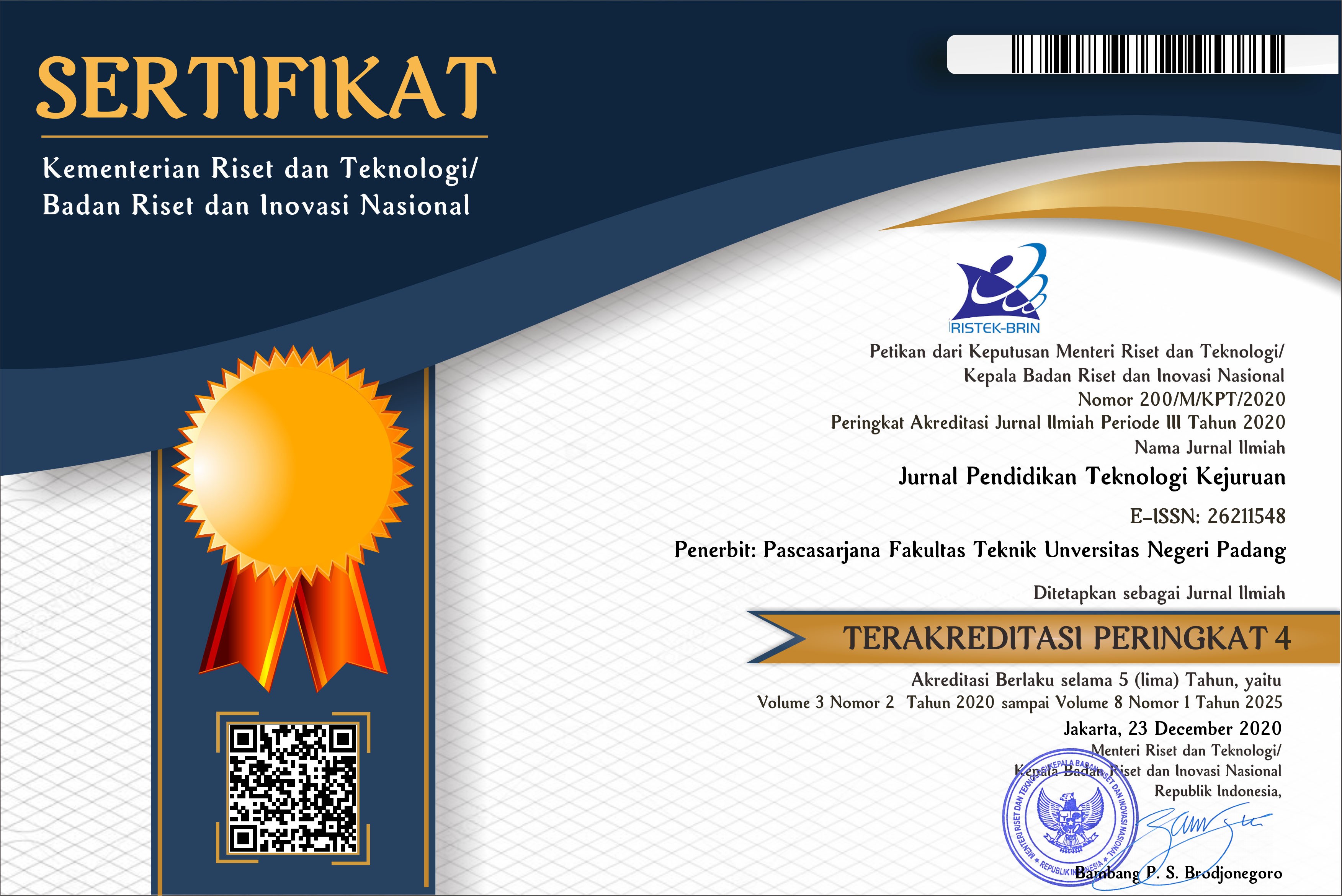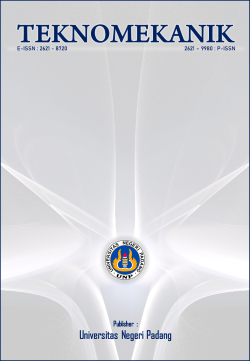Knowledge management and pedagogical innovativeness of vocational educators, the mediating role of transformational leadership style
Abstract
The study investigated the relationships on three dimensions of knowledge management (KM), pedagogical innovativeness (PI) and transformational leadership style (TLS) Design used for the study was correlational and data were collected from 137 vocational educators/lecturers in public universities in Nigeria, this forms the sample of study. Structured questionnaire was instrument used, covering the demographic variables of the respondents and measured the relevant dimensions of knowledge management, pedagogical innovativeness and transformational leadership style. Three experts face validated instrument for study. The reliability was measured using Cronbach alpha method and an overall alpha value of 0.89 was obtained. The data was collected by the authors and analysed. Bivariate correlation linear regression and path analysis via 5000 re-samples bootstrap method was used for analysis. The results showed that knowledge management dimensions i.e. knowledge dissemination, responsiveness to knowledge predict significantly pedagogical innovativeness while knowledge acquisition did not significantly predict pedagogical innovativeness. It also showed that transformational leadership style does mediate relationship between knowledge management and pedagogical innovativeness. The results suggest that knowledge acquisition (KA), knowledge dissemination (KD) responsiveness to knowledge (RK) are among the key indicators of pedagogical innovativeness. The result also suggest that low transformational leadership style will not bring about the relationship between knowledge management and pedagogical innovativeness. Based on findings it was recommended that knowledge management should be encourage in tertiary institutions as this will enhanced pedagogical innovativeness of vocational educators. Also, management of tertiary institution should employ transformational leadership style for ultima productivity of their employees.
References
Andreeva, T., & Kianto, A. (2011). Knowledge processes, knowledge‐intensity and innovation: a moderated mediation analysis. Journal of Knowledge Management, 15(6), 1016–1034. https://doi.org/10.1108/13673271111179343
Audenaert, M., Vanderstraeten, A., & Buyens, D. (2017). When innovation requirements empower individual innovation: the role of job complexity. Personnel Review, 46(3), 608–623. https://doi.org/10.1108/PR-10-2014-0219
Avolio, B. J., & Bass, B. M. (2004). Multifactor leadership questionnaire manual (Third Edition). Menlo Park, CA: Mind Garden, Inc.
Bueno, E., Anton, J. M. R., & Salmador, M. P. (2008). Knowledge creation as a dynamic capability: implications for innovation management and organisational design. International Journal of Technology Management, 41(1/2), 155–168. https://doi.org/10.1504/IJTM.2008.015989
Ceptureanu, E. G., Ceptureanu, S. I., & Popescu, D. (2017). Relationship between Entropy, Corporate Entrepreneurship and Organizational Capabilities in Romanian Medium Sized Enterprises. Entropy, 19(8), 412. https://doi.org/10.3390/e19080412
Chang, Y.-Y., Chang, C.-Y., & Chen, C.-W. (2017). Transformational leadership and corporate entrepreneurship. Leadership & Organization Development Journal, 38(6), 812–833. https://doi.org/10.1108/LODJ-10-2015-0219
Chen, A. N. K., Hwang, Y., & Raghu, T. S. (2010). Knowledge Life Cycle, Knowledge Inventory, and Knowledge Acquisition Strategies*. Decision Sciences, 41(1), 21–47. https://doi.org/10.1111/j.1540-5915.2009.00258.x
Chen, C.-L. (2017). Service providers’ sustainable service innovation: service-dominant logic. The Service Industries Journal, 37(9–10), 628–656. https://doi.org/10.1080/02642069.2017.1340456
Cheung, M. F. Y., & Wong, C. (2011). Transformational leadership, leader support, and employee creativity. Leadership & Organization Development Journal, 32(7), 656–672. https://doi.org/10.1108/01437731111169988
Chukwuemeke, H. E., & Igbinedion, V. I. (2021). Relationship between knowledge dissemination, learning self-efficacy and task performance of business educators. NAU Journal of Technology and Vocational Education, 6(1), 13–21.
Chung-Wen, Y. (2008). The relationships among leadership styles, entrepreneurial orientation, and business performance. Managing Global Transitions, 6(3), 257.
Dalziell, E., & McManus, S. (2004). Resilience, vulnerability and adaptive capacity: implications for system performance. Paper presented at the International Forum for Engineering Decision Making. http://hdl.handle.net/10092/2809
Darroch, J. (2005). Knowledge management, innovation and firm performance. Journal of Knowledge Management, 9(3), 101–115. https://doi.org/10.1108/13673270510602809
Dixit, A., & Upadhyay, Y. (2021). Role of JD-R model in upticking innovative work behaviour among higher education faculty. RAUSP Management Journal, 56(2), 156–169. https://doi.org/10.1108/RAUSP-03-2020-0060
du Plessis, M. (2007). Knowledge management: what makes complex implementations successful? Journal of Knowledge Management, 11(2), 91–101. https://doi.org/10.1108/13673270710738942
Durodie, B. (2003). Is real resilience attainable? The Monitor, 2(6), 15–19.
Eyal, O., & Kark, R. (2004). How do Transformational Leaders Transform Organizations? A Study of the Relationship between Leadership and Entrepreneurship. Leadership and Policy in Schools, 3(3), 211–235. https://doi.org/10.1080/15700760490503715
Federal Republic of Nigeria. (2013). National policy on education. Lagos: NERDC.
Fields, Z., & Bisschoff, C. A. (2013). A Theoretical Model to Measure Creativity at a University. Journal of Social Sciences, 34(1), 47–59. https://doi.org/10.1080/09718923.2013.11893117
Flatten, T., Adams, D., & Brettel, M. (2015). Fostering absorptive capacity through leadership: A cross-cultural analysis. Journal of World Business, 50(3), 519–534. https://doi.org/10.1016/j.jwb.2014.08.010
Gay, L. R., Mills, G. E., & Airasian, P. W. (2011). Educational research competencies for analysis and applications (10th ed.). New York: Pearson Educational International.
Hayes, A. F. (2013). Introduction to mediator, moderation, and conditional process analysis: A Regression-based approach. New York, NY: The Guilford Publications, Inc.
Ichijo, K., & Nonaka, I. (2007). Knowledge creation and management: New challenges for managers. USA, Oxford University Press.
Ile, C. M., & Edokpolor, J. E. (2020). A Reformulation of business education curriculum for the development of career opportunities among undergraduates of South Nigerian Universities. Asian Journal Of Assessment In Teaching And Learning, 10(1), 10–22. https://doi.org/10.37134/ajatel.vol10.1.2.2020
Jantunen, A. (2005). Knowledge‐processing capabilities and innovative performance: an empirical study. European Journal of Innovation Management, 8(3), 336–349. https://doi.org/10.1108/14601060510610199
Jung, D. (Don), Wu, A., & Chow, C. W. (2008). Towards understanding the direct and indirect effects of CEOs’ transformational leadership on firm innovation. The Leadership Quarterly, 19(5), 582–594. https://doi.org/10.1016/j.leaqua.2008.07.007
Keeley, E. (2004). Institutional research as the catalyst for the extent and effectiveness of knowledge management practices in improving planning and decision making in higher education organisations. Ph. D Dissertation.
Mitroff, I. I. (2005). From my perspective: Lessons from 9/11 Are companies better prepared today? Technological Forecasting & Social Change, 72(3), 375–376.
Murase, Y. (2021). An research framework of tacit knowledge transfer and educational practice in global hotel chains. Management Review: An International Journal, 16(1), 4–22.
Nemanich, L. A., & Vera, D. (2009). Transformational leadership and ambidexterity in the context of an acquisition. The Leadership Quarterly, 20(1), 19–33. https://doi.org/10.1016/j.leaqua.2008.11.002
Parsons, D. (2007). National organisational resilience framework workshop: The outcomes. National Organisational Resilience Framework Workshop, 5-7th December 2007, Mt. Macedon, Victoria, Australia, 15.
Poleacovschi, C., & Javernick-Will, A. (2020). The Importance of Expertise Visibility Across Organizational Boundaries for Individual Performance. Engineering Management Journal, 32(1), 37–45. https://doi.org/10.1080/10429247.2019.1661718
Rožman, M., Shmeleva, Z., & Tominc, P. (2019). Knowledge Management Components and Their Impact on Work Engagement of Employees. Naše Gospodarstvo/Our Economy, 65(1), 40–56. https://doi.org/10.2478/ngoe-2019-0004
Thuy, T. N., Nghi, N. N. G., Vy, N. Y., Lam, N. T. T., & Minh, P. C. (2021). Perceived risk of sharing other people’s information on Facebook: The perspective of young people in Ho Chi Minh City, Vietnam. Management Review: An International Journal, 16(2), 69–85.
Copyright (c) 2023 Helen Edowaye Chukwuemeke, Navid Nwanna Dumbiri

This work is licensed under a Creative Commons Attribution 4.0 International License.






